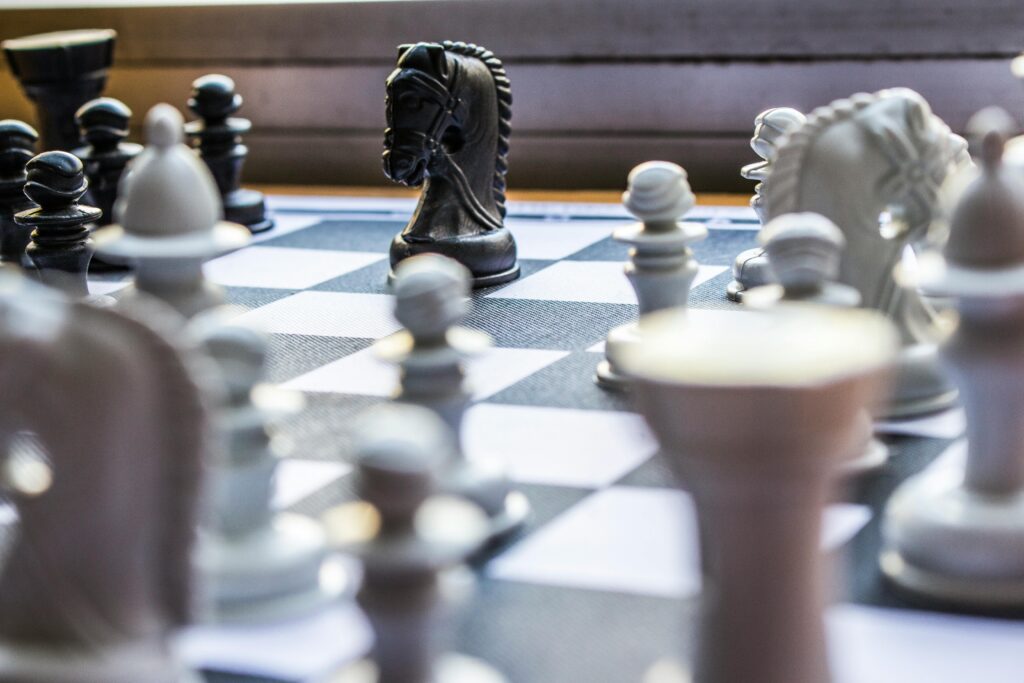Chess isn’t just a game of kings and queens. It’s a game of life. It teaches us how to think, plan, wait, and act at the right moment. It builds patience, sharp focus, and confidence. It helps kids make smart choices, not just on the board, but in school, at home, and even when they grow up.
Online Chess Training
Landscape of Chess Training in Solihull and Why Online Chess Training is the Right Choice
Solihull is a charming town in Birmingham. It’s full of great schools, green parks, and lots of young learners with curious minds. Over the years, more and more parents here have started looking for structured after-school activities that don’t just keep their kids busy—but also help them grow.
Chess became one of those perfect choices.
But here’s the thing: local chess coaching options in Solihull are mostly traditional. They happen in community centers or school halls, maybe once or twice a week. It’s usually a group setting, and often the teaching style is informal.
Sometimes it’s just a friendly player teaching a few tricks. Other times, it’s a coach with no clear plan, hopping from topic to topic. This style can work for some. But it’s not enough for kids who want to actually improve.
Now imagine this. Your child gets a personalized coach. A real expert. They meet regularly online, right from your living room. There’s a plan. A path. A goal. That’s what online chess coaching brings to Solihull—and it’s why more families here are choosing it over old-school training.
Online coaching brings the best coaches from around the world right to your screen. You don’t need to travel, wait in traffic, or miss dinner. You just log in, and the learning begins. It’s fun, it’s flexible, and most importantly—it works.
Online classes also give something that most local classes don’t: structure. There’s a full curriculum, like in school. You don’t just play games—you learn why each move matters. Step by step. And the results show quickly. Kids start thinking deeper, playing better, and gaining real confidence.
That’s why the landscape of chess training in Solihull is shifting. Online is the new smart choice. And at the top of this shift is one name: Global School of Chess.
How Global School of Chess is the Best Choice When It Comes to Chess Training in Solihull
Let’s talk about the best.
Global School of Chess isn’t just another online program. It’s a full academy. It’s built by real chess masters who love teaching kids. And it’s trusted by families in more than nine countries. From the very first class, everything is made simple, fun, and exciting.
Here’s what makes it stand out.
Every student gets matched with a FIDE-certified coach. That means your child is learning from someone who plays chess at the world level—and knows how to teach it in the simplest way possible. These coaches don’t just teach. They care. They learn about each student, what they know, what they don’t, and how they learn best.
Lessons are live. They’re interactive. Students talk, ask, answer, play, and grow. It’s never boring.
And guess what? There’s a full plan. It’s like a ladder. Kids climb one step at a time. First, they learn how the pieces move. Then, they learn how to control the board. Then tactics, strategy, endgames, openings—everything.
No guesswork. No wasted time.
Global School of Chess also runs online tournaments every two weeks. That means students don’t just learn—they compete. And they start winning. These tournaments are a big deal. They help kids stay sharp and excited. They also build sportsmanship, focus, and the ability to handle pressure. All from home.
And yes, there are private sessions too. Just your child and the coach, working together closely. These sessions go deep into what your child needs help with. It’s like chess tutoring, but so much better.
We’ve also made it super easy to get started. You can try a free class. No pressure. Just sign up and see if your child likes it. Most do—and they never look back.
This is the Global School of Chess difference. It’s built for today’s families. For parents who care. For kids who want to learn, grow, and shine.
Offline Chess Training
In Solihull and across Birmingham, many chess clubs still use the old-school way of teaching. A coach might meet a group of kids in a classroom or a small hall once a week. Sometimes it’s at a school, a library, or a local community center.
The idea is sweet—kids learning together, face to face, moving real pieces on a board. But that’s where the charm often stops.
Most offline classes follow a loose format. There’s no full curriculum. No clear progress map. It’s just casual games, scattered tips, and occasional puzzles. You never really know what your child is learning or whether they’re improving.
Sometimes, the coach is a parent volunteer. Sometimes, it’s a retired player. There are some great people—but very few follow a true system.
Offline coaching also comes with limits. Think about it:
Your child gets just one hour a week. If they miss one class? That’s a whole week lost.
You have to drive them there and back. That’s time, money, and stress.
There are many kids in one group. The coach can’t give each child personal attention.
If your child is shy, they may not ask questions or get heard.
You can’t record the session. So if your child forgets something, it’s gone.
Even if the coach is good, there’s only so much they can do in that short time.
In some cases, offline clubs turn into social hangouts more than learning centers. Kids may spend the whole class just playing games with no feedback. That’s fun—but not real coaching.
And let’s be honest. Offline coaching is stuck in the past. It hasn’t changed much in years. It doesn’t use new tools, videos, interactive boards, or world-class resources. It’s just a board, a room, and a coach doing their best with what they have.
This is why more families in Solihull are starting to look outside the local clubs. They want something better. Something structured. Something that fits their busy lives and gives their child real results.
And that brings us to the next point.
Drawbacks of Offline Chess Training
Let’s take a closer look at what offline training often gets wrong.
First, it lacks consistency. Coaches might not follow a set plan. One week could be about openings. The next week? Maybe random tactics. There’s no path. Just pieces of information. That makes it hard for kids to truly understand how to play the game step by step.
Second, it lacks tracking. With no online system or student dashboard, there’s no way to see how your child is growing. Are they stuck? Are they improving? Are they ready for the next level? You don’t know. You just hope for the best.
Third, there’s limited feedback. In big groups, kids make mistakes—but they don’t always get corrected. And if they do, it’s quick, with no time to go deeper. That’s not how real learning works.
Fourth, there’s no flexibility. If your child is sick or has a school event, they miss a class. No makeup, no recording, no catch-up. That missed hour is gone forever.
And fifth—no global exposure. Local offline clubs rarely hold real tournaments. And if they do, they’re small. Your child doesn’t get to test their skills against players from other cities or countries. There’s no big stage to shine on.
This is where online coaching, and especially Global School of Chess, makes a world of difference. It takes all the good parts of offline learning—and fixes the rest.
Best Chess Academies in Solihull
Now that we’ve explored the chess coaching landscape, let’s look at the top five options for chess training in Solihull, Birmingham. We’ll start with the best—Global School of Chess—and then share a few others that are doing good work in their own way. But as you’ll see, nothing compares to the experience, structure, and results that Global School of Chess brings to the table.
Global School of Chess
This is more than just an academy. This is a place where young minds discover what they’re truly capable of.
At Global School of Chess, every child is treated like they matter. From the moment you sign up for the free trial class, you feel the difference. The welcome is warm, the lessons are fun, and the coaches are world-class.
Not just good players—great teachers. And that’s a big difference.
Let’s talk about the curriculum. It’s not guesswork. It’s not random. It’s a carefully designed learning path built by FIDE-certified chess experts. The plan takes kids from the basics all the way to tournament-level play. Every lesson builds on the one before it.
Students understand, remember, and apply what they learn. That’s rare.
And it’s live. All lessons happen in real time, not just pre-recorded videos. Kids talk, ask, laugh, and learn. They get instant feedback, clear explanations, and real improvement.
Parents can see it too—from the way their child speaks about chess, to how they think through problems, to how they handle wins and losses with calm confidence.
There are group classes and one-on-one sessions. Group classes help students learn from each other and enjoy a friendly atmosphere. Private sessions dive deep into what each student needs most. Some need help with openings. Others want to improve their endgames. Some need mindset coaching. All of that is included.

Every two weeks, students take part in online tournaments. These aren’t just for fun (though they are fun!). They help students build competitive skills. They learn how to manage pressure, stay focused, and apply their learning in real games.
Plus, they get to compete with students from all over the world—something no local academy can offer.
There’s more. The coaches here don’t just teach chess. They mentor. They guide. They help students build life skills like discipline, patience, and strategic thinking. These lessons go far beyond the chessboard.
And the support system? Incredible. Parents get regular updates. There’s a full support team ready to answer questions. You always know what’s going on. You’re part of the journey.
Thousands of families across four continents already trust Global School of Chess. And it’s changing lives—one smart move at a time.
You can join from anywhere in Solihull, or really, anywhere in the world. All you need is a screen, an internet connection, and a curious mind.
Start with a free class. That’s the first step. You’ll see why this academy is not just leading the way—it’s setting the standard.
Solihull Chess Club
Solihull Chess Club is a local favorite. It meets once a week in a community hall. The coach there is friendly and welcoming. Kids enjoy the chance to play face to face with friends. But the lessons are casual. There’s no set plan or tracking. It’s more about playing and socializing. That’s fun—but it doesn’t help students level up in a clear way.
Birmingham Kings Chess Academy
This academy is based in Birmingham and runs regular weekend classes. The coach knows good tactics and openings. Students play over real boards. However, it still lacks a full structured curriculum.
It’s also a drive away from Solihull, which makes it less practical for weekly coaching. They don’t have online tournaments or private lesson options.
West Midlands Junior Chess
This group organizes after-school chess clubs across various schools in the West Midlands. They’re great for social chess and basic skill-building. But sessions depend on school schedules. Parents can’t track progress online, and there’s no one-on-one coaching. The lesson style remains quite informal.
Chess Mates UK – Midlands Branch
Chess Mates UK’s Midlands branch hosts lessons in Brum (Birmingham). They offer coaching for all levels and focus on happy learning. Coaches are patient and encouraging. Yet they don’t follow a global curriculum.

There are few online options, and tournaments are local and infrequent. It’s a good start for beginners—but not enough for kids who want to get serious.
Why Online Chess Training Is the Future
Online chess training is not just a trend—it’s a smarter, stronger, and more strategic way forward for both families and educational businesses. And it’s not just about learning chess. It’s about how kids learn in today’s world.
Let’s talk about why this shift is happening and how it benefits parents, students, and even local coaching businesses who are thinking ahead.
The Learning World Has Changed—And That’s a Good Thing
Kids today are digital learners. They’re not scared of screens—they thrive on them. When learning happens in a digital space, it feels more natural to them. They can click, drag, zoom, type, and speak. That comfort turns into confidence. It turns into quicker learning.
Now mix that with a well-designed online chess program—and you have magic.
Global School of Chess has seen this first-hand. Online training removes distractions like noisy classrooms or long commutes. Students are calmer, more focused, and more eager to engage. They’re in a space they feel safe in: home. That alone changes the learning game.
Online Is Not Lonely—It’s Global
A common myth: online learning is cold or isolating. But in reality, it’s the opposite—if done right.
Global School of Chess builds real friendships. In every group class, kids connect. They talk about moves, share wins, help each other solve puzzles. They compete in real-time tournaments with kids from Canada, the UK, India, and beyond. That kind of global exposure helps children think bigger. It helps them feel like they’re part of something big.
When students win in these global matches, their confidence explodes. And that confidence spills into school, social settings, and their future careers.
For Local Coaching Businesses: Online Is a Scalable Model
This section is for local chess coaches and academies still running weekend halls and school clubs.
If you’re reading this as a business owner, it’s time to see online as your ally, not your enemy.
Offline is limited—only so many chairs, so many kids, so many hours. Online opens everything up. You can serve more students, at more times, in more places. You can record sessions. Offer replays. Build your own structured courses. Reach parents who could never bring their child to your location.

Want to scale your chess business? Start by adding one live online group a week. Offer it as a “bonus class.” Then expand. Use tools like Lichess or Chess.com for boards. Zoom or Google Meet for live coaching. Use a curriculum. Plan it weekly. Keep records. Give homework. Give feedback. Teach chess like a school would teach math.
The growth will follow.
Action Steps for Parents and Coaches
For Parents:
- Choose a program that tracks progress.
- Look for live, interactive lessons—not just videos.
- Ask if there’s a curriculum in place.
- Make sure tournaments are part of the training.
- Talk to the coach. Watch how they engage your child.
- Use the free trial at Global School of Chess to see the difference for yourself.
For Coaches and Clubs:
- Start building your own curriculum now.
- Go hybrid: offer both offline and online classes.
- Use recorded sessions for revision and proof of progress.
- Don’t fear technology—use it to multiply your reach.
- Learn from leaders like Global School of Chess. Study how they structure, teach, and engage.
The chess world is going online—not to replace human connection, but to make it better, faster, and fairer. No more geography limits. No more gaps in learning. The future is online—and the smart ones are moving fast.
How Global School of Chess Leads the Online Chess Training Landscape
When it comes to online chess coaching, many programs promise results. But very few deliver an experience that is structured, scalable, and deeply transformational—for both students and the coaching ecosystem itself.
Global School of Chess doesn’t just participate in online training. It defines the gold standard.
Let’s go beyond the usual benefits and dig into how this academy leads the space—and what others can learn from it to improve their own offerings.
It Starts with a Real Curriculum—and Ends with Mastery
Most online platforms offer scattered learning. A few tactics here, a game analysis there. What’s missing? A true curriculum. Global School of Chess was built around a structured, tiered program that mirrors how elite players train.

Every student is placed at their correct level after assessment. And from there, they follow a journey. Like school grades. Like belts in martial arts.
Each level is clear, trackable, and full of milestones.
This builds a powerful sense of progress. Kids don’t just feel like they’re “learning something”—they know what they’ve learned. Parents can see it. Coaches can measure it. And students feel proud moving from one level to the next.
For other academies or chess businesses: Don’t just teach. Structure. Build levels. Add tests. Offer visible growth paths. This builds retention, engagement, and trust.
Every Coach Is a Chess Educator First
What makes Global School of Chess different isn’t just its coaches’ skill—but their training as educators. Every coach here is FIDE-certified, yes—but more importantly, they know how to teach. They simplify. They engage. They tailor lessons to each student’s learning style.
It’s one thing to be a good player. It’s another to help a 7-year-old understand the idea of “controlling the center” without using big words.
For coaching teams: Start training your staff in teaching skills, not just chess skills. Run regular teacher training. Focus on how to explain. How to listen. How to adapt. This turns coaches into trusted mentors—and boosts your results.
Technology Is Not a Tool—It’s Part of the Classroom
Global School of Chess doesn’t treat technology as an add-on. It is the classroom. Interactive chess boards. Student dashboards. Instant replay of past lessons. Online tournaments with real-time pairing and rankings. Built-in puzzles. Auto homework. Notes from coaches. Progress graphs.

The entire experience is seamless. It feels modern, yet human.
This doesn’t just help students—it helps the business scale.
For academies thinking long term: Build tech into your coaching model. Use data to track performance. Offer parents weekly updates through a dashboard. Archive lessons for each child. Let students review. Let coaches compare. Tech is not a threat to your coaching—it’s a superpower.
Community Is the Secret Ingredient
The most underrated aspect? The student community.
Global School of Chess builds bonds between its students. Through group classes, tournaments, team challenges, and leaderboards—students get to know each other. They cheer. They compete. They grow together.
And that changes everything.
Learning becomes sticky when it’s social. Kids want to show up. They want to improve. They want to win—but they also want to belong.
For other coaching platforms: Build community intentionally. Use small group formats. Create online events. Offer badges, streaks, and team points. Make the experience feel like a journey with others.

Actionable Advice for Growing Chess Programs
If you’re running a chess business or planning to start one, here’s a powerful checklist inspired by how Global School of Chess operates:
- Define Levels: Create 4–6 levels of learning with clear outcomes and tests.
- Train Coaches: Invest in how your coaches teach, not just what they teach.
- Use Dashboards: Let students and parents see progress in real time.
- Offer Hybrids: Combine group classes with private feedback sessions.
- Gamify It: Add points, badges, and small competitions inside the lessons.
- Build a Tribe: Let students meet each other. Let parents meet the team. Build trust.
Wrapping It Up
Choosing the right chess academy isn’t just about picking a coach. It’s about shaping your child’s mindset, their confidence, and their habits for life. Chess is more than just a game—it’s a mirror for smart thinking, focus, patience, and learning how to handle both wins and losses with grace.

